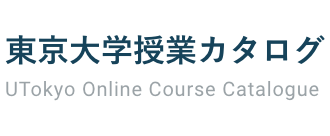過去(2020年度)の授業の情報です
学内のオンライン授業の情報漏洩防止のため,URLやアカウント、教室の記載は削除しております。
最終更新日:2024年4月1日
授業計画や教室は変更となる可能性があるため、必ずUTASで最新の情報を確認して下さい。
UTASにアクセスできない方は、担当教員または部局教務へお問い合わせ下さい。
最終更新日:2024年4月1日
授業計画や教室は変更となる可能性があるため、必ずUTASで最新の情報を確認して下さい。
UTASにアクセスできない方は、担当教員または部局教務へお問い合わせ下さい。
歴史・地域研究の基礎I
Sustainable Development Goals (SDGs) and Human Security- Southeast Asia and Japan in Global Society.
This course examines the issues of sustainable development/SDGs and human security in the case of Southeast Asia and Japan in global perspective. It conducts both theoretical and practical analysis on the issues based on the professor's own experiences of research, policy and practice on SDGs and Human Security from human centered perspective. Meanwhile the cases will be mainly Mekhong River Area of South East Asia and Japan that the professor has expertise, the course will also deal with the issues in other countries where students come from all over the world. Diverse academic and professional experiences of the students are highly appreciated to promote mutual active learning. As well known, SDGs motto is ‘Leave no one behind’, because the global development goals are not only for LMICs but also developed worlds including Japan, North America and Europe. Students need to bear in mind that SDGs are our own issue under the philosophy of ‘Think globally, act locally’.
The professor has both academic and professional backgrounds on the theme including United Nations Research Institute for Social Development, Ministry of Foreign Affairs, Japan, Japan International Cooperation Agency (JICA), local governments of Japan and NGOs/civil society. He is leading the research on the issue as the chair of JASID-SDGs (Japan Society for International Development, 'Sustainable Development and SDGs' research division).
The professor has both academic and professional backgrounds on the theme including United Nations Research Institute for Social Development, Ministry of Foreign Affairs, Japan, Japan International Cooperation Agency (JICA), local governments of Japan and NGOs/civil society. He is leading the research on the issue as the chair of JASID-SDGs (Japan Society for International Development, 'Sustainable Development and SDGs' research division).
時間割/共通科目コード
コース名
教員
学期
時限
08C4049
FAS-CA4V17L3
歴史・地域研究の基礎I
野田 真里
金曜3限
講義使用言語
英語
単位
2
実務経験のある教員による授業科目
NO
他学部履修
可
開講所属
教養学部
授業計画
1.Introduction
【Theories of Human Security and SDGs】
2. Critical review of development theories.
3. Human Security and State Security
4. Dimensions of Human Security: `Protection and Empowerment’, and ‘Free from Fears, Free form Wants’.
5. Pillars of Sustainable Development and SDGs: Economic Development, Social Development and Environmental Protection.
6. SDGs and Multi-Stakeholders Partnership: International Organization, National and Local Government, Business, NGOs/Civil Society, and Community.
【Global Comparative Analysis of Human Security and SDGs】
7.SDGs and Human Security in Southeast Asia.
8.SDGs and Human Security in Japan.
9. Student’s pair/ small group work on the global comparative analysis (1)
10. Students pair/ small group work on the global comparative analysis (2)
11. Terminal presentation (1)
12. Terminal presentation (2)
13. Conclusion and wrap up.
*The class schedule will be subject to change.
*The opportunities to invite guest speakers and/or to visit relevant institutions may be available.
授業の方法
It is highly expected to promote active participation, commitment of students with various academic and professional background from all over the world. Collaboration, not competition, in global networking among participants are also appreciated. Based on this, the course uses learner’s centered approach with 'active learning' as well as workshop method, that are popular in development community. It also uses ICT to promote the global network and mutual help for effective learning.
成績評価方法
1)Commitment to the class works and assignments*-50%
2)Terminal presentation and term paper **-50%
*Assignments: reflection paper, short essay and/or others.
**Term paper: long academic essay or relevant work.
教科書
1)Commission on Human Security (2003), Human Security Now, the United Nations.
2)The United Nations General Assembly (2015), Transforming Our World: 2030 Agenda for Sustainable Development.
*Both are available on UN website.
参考書
Further readings may be suggested in the class.
履修上の注意
To improve the quality of education;
-This course requires students’ active participation.
-It uses e-leaning and other relevant methods.
-Special sessions may be organized such as invitation of guest speakers, field work etc. In the case of field work, travel costs and other fees should be covered by students.
-For special sessions, the class schedule may be changed.
-Academic and practical opportunities related to the subject may be suggested.





 学部後期課程
学部後期課程

 マイリストに追加
マイリストに追加
 マイリストから削除
マイリストから削除



